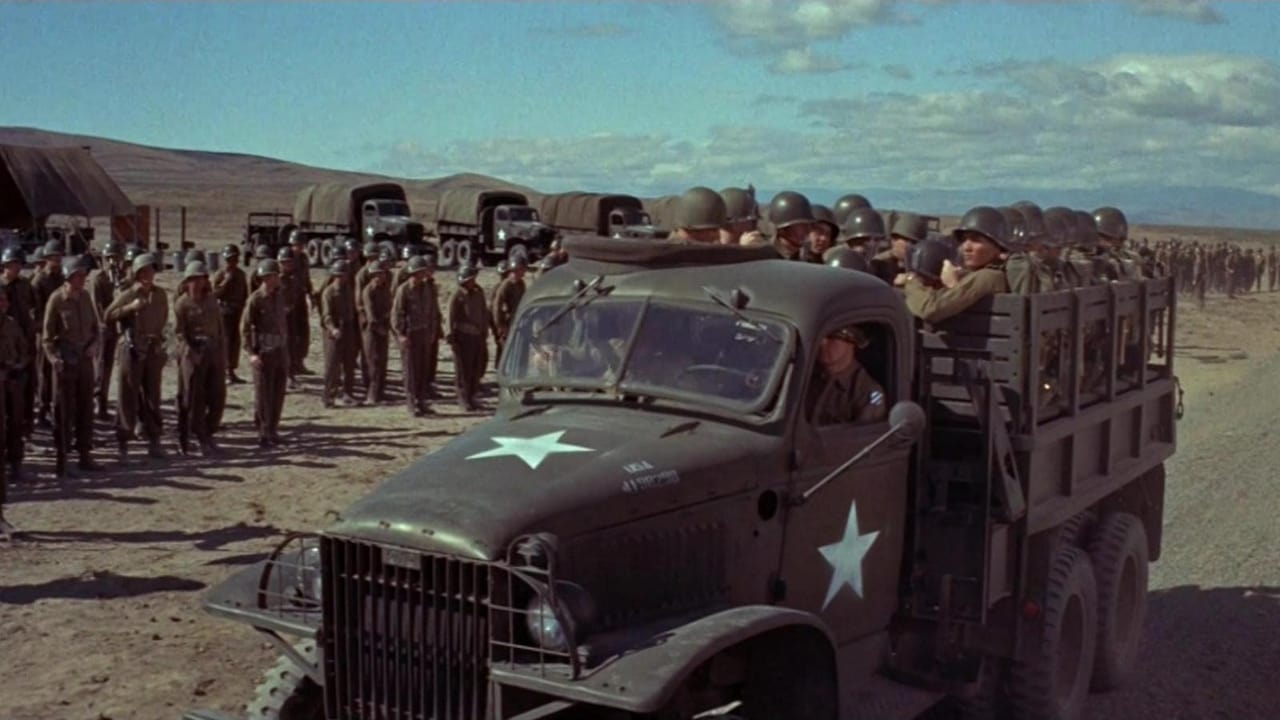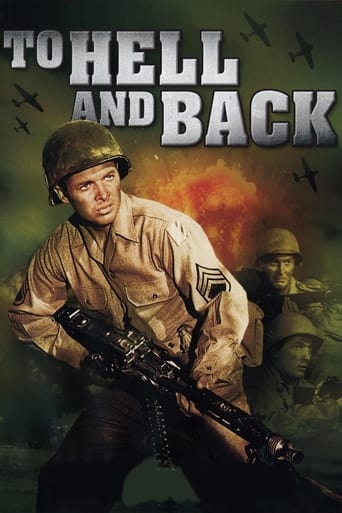Plantiana
Yawn. Poorly Filmed Snooze Fest.
Softwing
Most undeservingly overhyped movie of all time??
Glucedee
It's hard to see any effort in the film. There's no comedy to speak of, no real drama and, worst of all.
ChicDragon
It's a mild crowd pleaser for people who are exhausted by blockbusters.
jasonam
A story of one soldier's journey through various theaters of World War 2, To Hell and Back is unique due to its lead actor portraying himself. Real life veteran Audie Murphy took many steps to ensure this film captured the essence of what regular soldiers went through, and it shows. While the action and cinematography may not have aged as well, the genuineness of the dialogue and heart displayed by all of the platoon members allow this film to remain enjoyable over half a century later.
disinterested_spectator
Audie Murphy was never much of an actor. The only movie he starred in that is worth watching is "To Hell and Back," in which he does a decent job of acting, though one suspects that other actors could have done much better. And yet, the movie just would not have been the same without him.In the book on which this movie was based, Murphy referred to his "thin frame and cursed baby face," which made his commanding officer want to keep him away from the front, giving him light duty, but Murphy kept sneaking off with patrols and scouting parties. Eventually, the company commander gave up and put Murphy back in the front lines. Because our idea of a hero is someone who looks like Rambo, Murphy would never have been cast in this part had the movie been fictional. Even knowing that the movie was based on a true story, the audience might still have been incredulous had a little man with a baby face other than Murphy played the part. Imagine Elisha Cook, Jr. in that role. But by having Murphy play the part himself, we are forced to accept the fact that the kind of actor who plays the hero in a typical movie and the kind of man who is a real hero can be two very different things. And when we reflect on the fact that Murphy was thirty years old when he made the movie, we realize he must have really looked like a baby when he enlisted at the age of seventeen.We all know that movies often diverge from the books they are based on, and so we usually just assess the movie on its own terms. There is one event described in the book, however, that is worth calling attention to, especially since almost no one has read it. Early in the war, when Murphy's company is in Sicily, they come across a couple of Italian officers. Murphy describes the magnificent white horses the Italians mount and on which they ride away. Murphy raises his rifle, fires twice, killing them both. The lieutenant is appalled. He asks Murphy why he did that, saying he should not have shot them. Murphy argues back, telling the lieutenant that that killing the enemy is "our job." Murphy notes that new men are trained to talk tough and act tough, but it takes a while before they accept the fact that they are supposed to "deal out death," and that the lieutenant had not yet accepted that fact.The Italian officers were the first two men Murphy killed, and it is the most unforgettable passage in the book, but there is no mystery why it never made its way into the movie. Generally speaking, we do not like to see our heroes shoot retreating men in the back in cold blood. In most war movies, bullets are flying back and forth, and so it is kill or be killed. But Murphy's life was not in danger when he pulled the trigger. Better still, we like it when something happens that makes the war personal. Later in the movie, in the scene where Murphy charges up a hill and singlehandedly takes out two machine gun nests, what precipitates his heroism is the death of his friend, which makes him angry. But Murphy was not angry when he killed the Italian officers.There is another reason why that event never made it into the movie. There is an unwritten law that in any movie set during World War II, under no circumstances will an American soldier be seen killing Italians, just as there must be no scene of Italian soldiers killing Americans. Granted, the early surrender of the Italians made the occasion for killing or being killed by Italians infrequent, but not so infrequent that the occasion did not occur in Murphy's case. The Italians did not sneak attack us at Pearl Harbor, and the Italians did not run camps like Auschwitz. They were a pipsqueak nation that never had much of a chance to do anything to us, and so we suppress combat scenes between American and Italian soldiers.Along these lines, in the typical combat movie made during World War II, there is the obligatory ethnic diversity: an Anglo-Saxon officer, a Mexican, a Pole, an Irishman, an American Indian, and always an Italian. We never see German-Americans or Japanese-Americans as part of the mix. Though a lot of Japanese-Americans were sent to concentration camps, euphemistically referred to as relocation centers, some still did serve in the American armed forces. But we don't see them so much in the movies (though reference is made to one having done so in "Bad Day at Black Rock" (1955)). But no combat movie is complete without an Italian as part of the company, America's way of saying that the Italians were really not evil, they just got tricked by Mussolini.Even if there is a remake of this movie, I doubt that Murphy's killing the Italian officers would be depicted in it either. In fact, such a remake would undoubtedly have a scene showing Murphy suffering from PTSD after the war was over (regardless of whether that was true or not). In the 1950s, we were perfectly comfortable with the idea that soldiers fought World War II with a clean conscience. Today, that might disturb us, especially after seeing him kill in cold blood.
grendelkhan
Audie Murphy was just a kid from Texas, who had been turned away by the Marines, the Navy and the Army Airborne. However, he finally finagled his way into the Army and proceeded to make history. What often gets glossed over in the recounting of Murphy's brave deeds was his leadership. This was a 19 year-old leading a platoon in combat. The film captures this quite well.Since the film was produced in the 50s, it has the look and feel of a recruiting commercial. The film had to co-operation of the Army and that usually means we are going to stress heroics over realism. However, the film never fully descends into propaganda, thanks in large part to Murphy's honest portrayal of the fear of combat, the loss of friends, and other aspects of life at war.Murphy plays himself, though he was in his 30s. He had a babyface, which eases you into accepting this. Besides, he knew how he felt at those moments and he portrays it on screen.Audie Murphy was a sharecroppers son, one of 12 children. His father ran out on the family, leaving them struggle. We see young Audie take responsibility for the family, sacrificing his education to earn a living. This theme will be carried forward, as Murphy finds himself given greater and greater responsibility, often against his wishes.Murphy was never destined for an Oscar, but he knows this role inside and out. He lived it. He has a quiet honesty that is refreshing, especially in an era of "heroic" war films. Murphy was a real hero, but it wasn't about glory; it was a job that needed doing. He never overplays things and the script wisely sticks to moments of comradery and action.The rest of the cast is filled out with fine character actors who, like their characters, do their bit. We get some memorable figures for Audie to bond with and see his reaction to their loss. They are given real meaning so we get a small understanding of the loss that Murphy felt and the reason he performed such daring acts of bravery: they were trying to kill his friends.The film never reaches the level of greatness, but it does its job of telling the story of Audie Murphy, without pomp or flash, much like the real man. If it has a real weakness, it's that it doesn't follow Murphy into civilian life, after his fame. Murphy was not only noted for his bravery on the battlefield, but also for his courage in discussing the emotional and psychological scars he carried with him for the rest of his life. In an era when soldiers didn't discuss the effect that combat had upon them, Murphy did so, letting others know that they weren't alone. Again, he was a leader.
alexandre michel liberman (tmwest)
When I was at school in my early teens, never a film was so much talked about after a weekend. The guys loved it, and one scene when they give chocolate bars to the soldiers, stuck to one's mind and one's appetite. I saw this film on DVD yesterday and either the chocolate scene was missing or unconsciously I slept through it. There is not much of a plot to the film, because it shows the real hero Audie Murphy in combat. But what great action scenes! The soldiers capturing a house in the field and then losing it, Murphy blowing a tank, shooting by mistake at himself in the mirror, standing on a tank in flames, throwing grenades at a pillbox, crossing a river under fire, whatever you think it is there, and in Cinemascope, which adapts very well to the widescreen format. We are used to see actors playing heroes, but here we see a hero which played western characters that could never be as brave as he was in real life. Everybody would think it is unreal!!!

